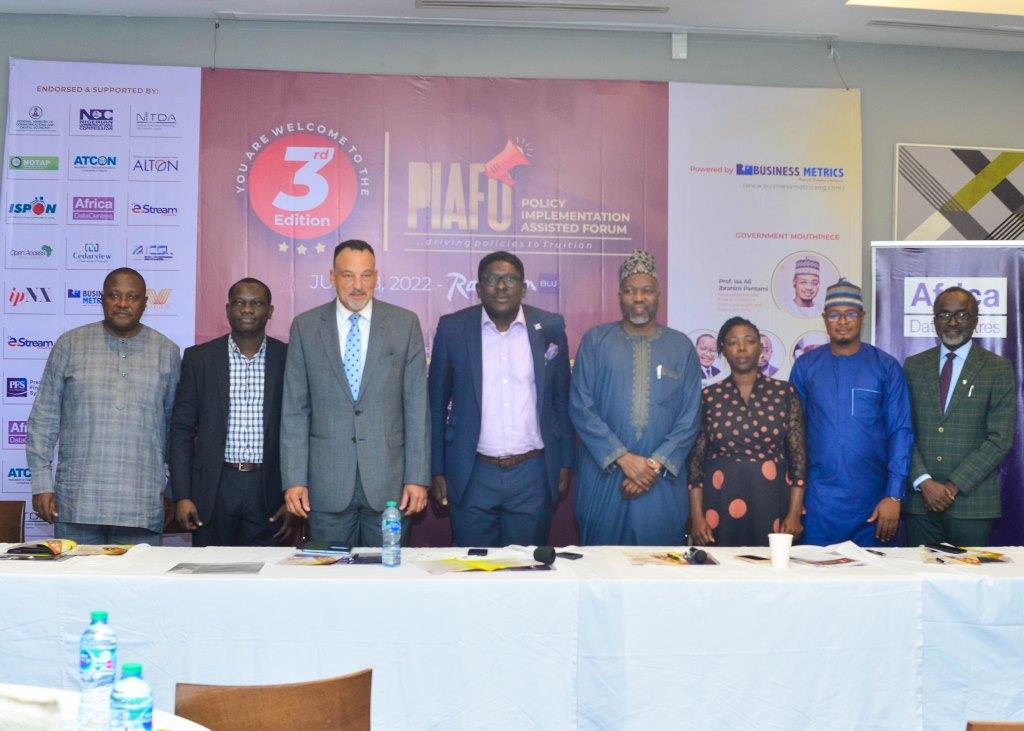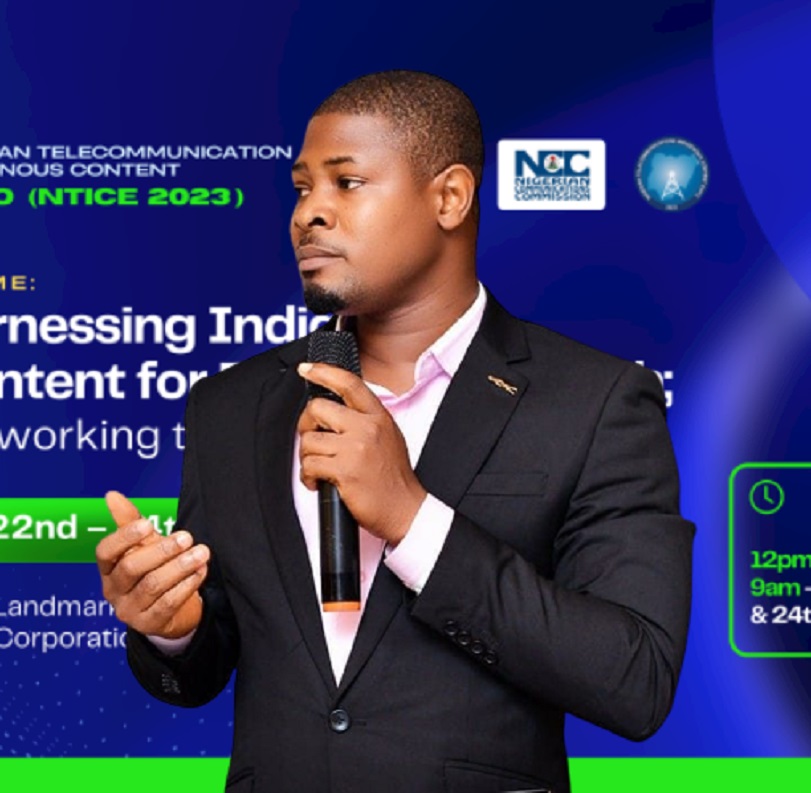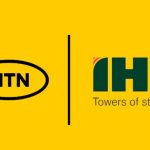Technology
Omobayo Azeez Decries Reliance of Telecommunications Sector on Foreign Inputs

By Dipo Olowookere
A renowned tech journalist, Mr Omobayo Azeez, has called on stakeholders in the telecommunications sector to urgently take actions that will reduce the reliance on foreign inputs in the industry.
Speaking in Lagos last Thursday at the third edition of the Policy Implementation Assisted Forum (PIAFo), Mr Azeez said this was putting more pressure on the Naira in the foreign exchange (FX) market.
Though he said the telecoms sector has unarguably become one indispensable economic enabler for the country and its people, efforts must be made to use this channel to boost local production and stop the loss of $2.16 billion in capital flights.
“When operators have to depend solely on foreign talents, solutions, equipment and accessories, they will also have to deal with the hassle of accessing forex as one of the major problems.
“As such, operators suffer, customers suffer and even our dear Naira is also at a receiving end – it continues to lose value,” he said at the event themed Establishing Trackable Metrics for Developing Nigeria’s Indigenous Telecoms Sector.
Mr Azeez, who is the Managing Editor of Business Metrics, further stated that, “We realise that with the policy in place, the work has just begun because the effective implementation of a policy is the true measure of its success. We want this policy to come to fruition and create inclusive benefits for individuals, businesses and the economy.”
On his part, the Executive Vice Chairman of the Nigerian Communications Commission (NCC), Professor Umar Danbatta, agreed with Mr Azeez, who is the convener of the forum, noting that the agency has so far identified 72 action points to promote indigenous content in the telecoms sector.
He added that the commission has also brought at least 30 stakeholders to the round table to chart the way for the effective implementation of the National Policy for Promotion of Indigenous Content Policy in the Nigerian Telecommunications Sector (NPPIC) assented to By President Muhammadu Buhari in May 2021.
Represented by Babagana Digima, Head of the Nigeria Office for Promoting the Indigenous Telecoms Sector (NODITS), the EVC stressed that different entities include Ministries, Departments and Agencies (MDAs), Mobile Network Operators (MNOs), SIM card manufacturers, tower and mast manufacturers, and Original Equipment Manufacturers (OEMs).
“At a higher level, the Commission had identified some time-based metrics for NPPIC which it classed into immediate, short term, medium term, and long-term items these include activities such as the creation of NODITS dedicated to guiding the policy; constitution of the local content steering committee; engagement with relevant internal and external stakeholders; and commissioning baseline studies on the level of indigenous content in the Nigerian telecoms industry,” he stated.
He, therefore, called on industry stakeholders, watchdogs and partners such as Business Metrics to create independent metrics that will ensure the achievements of the goals of the NPPIC.”
Technology
Leticia Otomewo Becomes Secure Electronic Technology’s Acting Secretary

By Aduragbemi Omiyale
One of the players in the Nigerian gaming industry, Secure Electronic Technology (SET) Plc, has appointed Ms Leticia Otomewo as its acting secretary.
This followed the expiration of the company’s service contract with the former occupier of the seat, Ms Irene Attoe, on January 31, 2026.
A statement to the Nigerian Exchange (NGX) Limited on Thursday said Ms Otomewo would remain the organisation’s scribe in an acting capacity, pending the ratification and appointment of a substantive company secretary at the next board meeting.
She was described in the notice signed by the Managing Director of the firm, Mr Oyeyemi Olusoji, as “a results-driven executive with 22 years of experience in driving business growth, leading high-performing teams, and delivering innovative solutions.”
The acting secretary is also said to be “a collaborative leader with a passion for mentoring and developing talent.”
“The company assures the investing public that all Company Secretariat responsibilities and regulatory obligations will continue to be discharged in full compliance with the Companies and Allied Matters Act, applicable regulations, and the Nigerian Exchange Limited Listing Rules,” the disclosure assured.
Meanwhile, the board thanked Ms Attoe “for professionalism and contributions to the Company during the period of her engagement and wishes her well in her future endeavours.”
Technology
Russia Blocks WhatsApp Messaging Service

By Adedapo Adesanya
The Russian government on Thursday confirmed it has blocked the WhatsApp messaging service, as it moves to further control information flow in the country.
It urged Russians to use a new state-backed platform called Max instead of the Meta-owned service.
WhatsApp issued a statement earlier saying Russia had attempted to “fully block” its messaging service in the country to force people toward Max, which it described as a “surveillance app.”
“Today the Russian government attempted to fully block WhatsApp in an effort to drive people to a state-owned surveillance app,” WhatsApp posted on social media platform X.
“Trying to isolate over 100 million users from private and secure communication is a backwards step and can only lead to less safety for people in Russia,” it said, adding: “We continue to do everything we can to keep users connected.”
Russia’s latest move against social media platforms and messaging services like WhatsApp, Signal and Telegram comes amid a wider attempt to drive users toward domestic and more easily controlled and monitored services, such as Max.
Russia’s telecoms watchdog, Roskomnadzor, has accused messaging apps Telegram and WhatsApp of failing to comply with Russian legislation requiring companies to store Russian users’ data inside the country, and of failing to introduce measures to stop their platforms from being used for allegedly criminal or terrorist purposes.
It has used this as a basis for slowing down or blocking their operations, with restrictions coming into force since last year.
For Telegram, it may be next, but so far the Russian government has been admittedly slowing down its operations “due to the fact that the company isn’t complying with the requirements of Russian legislation.”
The chat service, founded by Russian developers but headquartered in Dubai, has been a principal target for Roskomnadzor’s scrutiny and increasing restrictions, with users reporting sluggish performance on the app since January.
Technology
Nigerian AI Startup Decide Ranks Fourth Globally for Spreadsheet Accuracy

By Adedapo Adesanya
Nigerian startup, Decide, has emerged as the fourth most accurate Artificial Intelligence (AI) agent for spreadsheet tasks globally, according to results from SpreadsheetBench, a widely referenced benchmark for evaluating AI performance on real-world spreadsheet problems.
According to the founder, Mr Abiodun Adetona, the ranking places Decide alongside well-funded global AI startups, including Microsoft, OpenAI, and Anthropic.
Mr Adetona, an ex-Flutterwave developer, also revealed that Decide now has over 3,000 users, including some who are paying customers, a signal to the ability of the startup to scale in the near future.
SpreadsheetBench is a comprehensive evaluation framework designed to push Large Language Models (LLMs) to their limits in understanding and manipulating spreadsheet data. While many benchmarks focus on simple table QA, SpreadsheetBench treats a spreadsheet as a complex ecosystem involving spatial layouts, formulas, and multi-step reasoning. So far, only three agents rank higher than Decide, namely Nobie Agent, Shortcut.ai, and Qingqiu Agent.
Mr Adetona said SpreadsheetBench measures how well AI agents can handle practical spreadsheet tasks such as writing formulas, cleaning messy data, working across multiple sheets, and reasoning through complex Excel workflows. Decide recorded an 82.5% accuracy score, solving 330 out of 400 verified tasks.
“The result reflects sustained investment in applied research, product iteration, and learning from real-world spreadsheet workloads across a wide range of use cases,” Mr Adetona told Business Post.
For Mr Adetona, who built Decide out of frustration with how much time professionals spend manually cleaning data, debugging formulas, and moving between sheets, “This milestone highlights how focused engineering and domain-specific AI development can deliver frontier-level performance outside of large research organisations. By concentrating on practical business data problems and building systems grounded in real user environments, we believe smaller teams can contribute meaningfully to advancing applied AI.”
“For Decide, this is a foundation for continued progress in intelligent spreadsheet and analytics automation,” he added.
-

 Feature/OPED6 years ago
Feature/OPED6 years agoDavos was Different this year
-
Travel/Tourism10 years ago
Lagos Seals Western Lodge Hotel In Ikorodu
-

 Showbiz3 years ago
Showbiz3 years agoEstranged Lover Releases Videos of Empress Njamah Bathing
-

 Banking8 years ago
Banking8 years agoSort Codes of GTBank Branches in Nigeria
-

 Economy3 years ago
Economy3 years agoSubsidy Removal: CNG at N130 Per Litre Cheaper Than Petrol—IPMAN
-

 Banking3 years ago
Banking3 years agoSort Codes of UBA Branches in Nigeria
-

 Banking3 years ago
Banking3 years agoFirst Bank Announces Planned Downtime
-

 Sports3 years ago
Sports3 years agoHighest Paid Nigerian Footballer – How Much Do Nigerian Footballers Earn

















